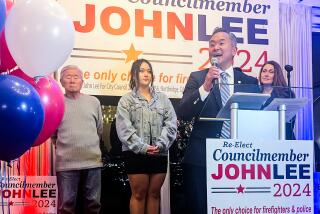Classes Aim to Teach Candidates Rules of Road in Campaigning
- Share via
In a sort of driver education course for politicians, dozens of normally speechifying candidates for Los Angeles mayor and the City Council were forced to sit quietly Saturday and listen to the new rules of the road in campaigning.
As part of the first full-blown city election under reforms approved by voters three years ago, the Ethics Commission summoned candidates and aides for one in a series of mandatory training sessions on new laws intended to more tightly regulate fund raising and spending.
“It is sort of like (taking classes) to get your driver’s license,” said Councilman Michael Woo, one of several casually clad mayoral candidates scattered among the audience in a Civic Center auditorium.
The four-hour session is part of an extensive effort to educate candidates of their legal duties under complex new laws intended to beef up financial disclosure requirements, limit contributions and provide hundreds of thousands of dollars in public matching funds to curb the influence of special interests.
It came as candidates, particularly for mayor, are gearing up for an expected record-setting frenzy of political fund raising. A field of 21 candidates is seeking to succeed retiring Mayor Tom Bradley, and at least two council seats are up for grabs in April.
Several top mayoral contenders already have sailed passed the $2-million mark in combined fund raising, interviews indicate. Multimillionaire businessman Richard Riordan and Woo apparently are early leaders in a dollar derby that could total $10 million to $12 million in the primary.
City Atty. and reelection candidate James K. Hahn said “what they’re trying to do is put people on notice so they can’t (later) plead ignorance.”
Ben Bycel, the commission’s executive director, agreed. “There wouldn’t be a traffic school if there hadn’t been so many speeders,” he said.
Although the commission has formidable new investigative powers in political cases, Bycel and his staff said Saturday that they would rather use education than enforcement to gain compliance.
With nearly 100 candidates running for city offices in the April election, a large crowd turned out to hear warnings about misusing public offices for campaign purposes, properly reporting contributions, and lessons on how to obtain public funds.
Special attention was devoted to spotting potentially illegal contributions. The training was added partly as a result of inquiries from concerned elected officials after news broke of an ambitious Ethics Commission and state Fair Political Practices Commission probe of alleged campaign money-laundering networks in Los Angeles. The schemes are suspected of concealing the true source of tens of thousands of dollars in special-interest money funneled into state and local campaigns.
Based the commission’s year-long investigation, Bycel told the assembled candidates and aides, “money laundering is a major problem in the city of Los Angeles. . . . Our goal is to root (it) out.”
While acknowledging it places an added burden on a campaign, Mimi Strauss, the commission’s chief of enforcement, called on candidates and workers to scrutinize all large contributions for signs of possible laundering--such as clusters of donations from relatives, co-workers and unfamiliar donors with low-paying jobs.
Calls should be placed to any suspicious donors and checks promptly returned if questions remain.
A few candidates appeared annoyed by the required attendance. “I would prefer to just have the material to read,” said Councilwoman Joy Picus, who is up for reelection in the west San Fernando Valley.
Others worried that all the paperwork and checking would be an enormous task, even as they voiced support for the efforts to ensure cleaner elections.
“It’s healthy, but it’s difficult,” said mayoral candidate Nick Patsaouras, president of the Southern California Rapid Transit District board.
Picus added: “If you don’t pay a lot of attention, you’re going to get nailed.”
Woo noted that in a major campaign such as his there can be thousands of individual donors to track. “It’s a great challenge,” he said, adding that his aides had instituted procedures to screen all donations.
In the fund-raising contest for mayor, which could be a significant factor in sorting out the still muddled field, it appears that Riordan and Woo are off to the quickest start.
Although the first detailed public reports will not be available until later this month, aides to Riordan said they expect to report a total of nearly $700,000 raised.
Woo’s campaign manager said they will report more than $500,000, but declined to be more specific.
Assemblyman Richard Katz (D-Panorama City) is expected to report close to $500,000 in contributions, and Councilman Joel Wachs will be in the $350,000 range, interviews indicate.
Councilman Nate Holden has notified the Ethics Commission that he raised more than $200,000, but declined in an interview to be more specific.
Other prominent contenders, including former school board member Julian Nava, former Deputy Mayor Tom Houston, Patsaouras, and former Parks and Recreation Commissioner J. Stanley Sanders, remain under the $200,000 level.
More to Read
Sign up for Essential California
The most important California stories and recommendations in your inbox every morning.
You may occasionally receive promotional content from the Los Angeles Times.










